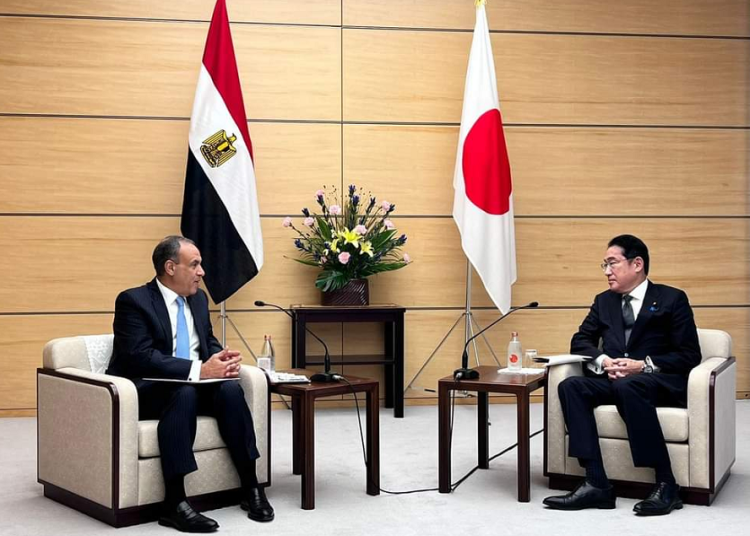Egypt’s Minister of Foreign Affairs, Emigration and Egyptian Expatriates Badr Abdelatty handed over on Friday a message from President Abdel Fattah El Sisi to Japanese Prime Minister Fumio Kishida on means of boosting bilateral ties.
This came during Kishida’s meeting with Abdelatty, who is currently visiting Tokyo to participate in the ministerial meeting of Tokyo International Conference on African Development (TICAD).
In statements on Friday, Spokesman for the Foreign and Emigration Ministry Ahmed Abu Zeid said that Abdelatty conveyed President Sisi’s greetings to the Japanese prime minister, expressing his appreciation of the Japanese role in elevating ties to a “strategic partnership” between the two countries.
Abdelatty also praised the Japanese prime minister’s successful visit to Egypt in April 2023, during which the two countries agreed to deepen bilateral relations by elevating the Japan-Egypt relations to a “strategic partnership”.
He also praised Japan’s support for important development projects in Egypt, topped by the Grand Egyptian Museum (GEM) and the partnership between the two countries in the field of education.
In this regard, Abdelatty stressed Egypt’s keenness on expanding areas of cooperation to include new areas, such as AI governance, and cooperation between institutions and research centers to exchange expertise and increase the flow of Japanese tourism to Egypt.
For his part, the Japanese prime minister was keen to convey his greetings to President Sisi, commending his pioneering role in various regional issues and international forums.
Egypt is a key partner for Japan, he said, adding it is a major regional country that plays a pivotal role in the Middle East region.
Regarding economic cooperation between the two countries, Abdelatty expressed Egypt’s keenness to shore up economic and trade cooperation between the two countries.
He also stressed the importance of beefing up the Japanese investments in the Egyptian market, and Egypt’s success in attracting many investments despite the regional and global economic challenges, citing the outcomes of the Egypt-EU Investment Conference, which was held in Cairo on 29-30 June.
Abdelatty added that Egypt is keen on opening new areas of joint economic cooperation, particularly those related to climate change.
He invited the Japanese companies to benefit from Egypt’s low-carbon hydrogen strategy that was approved in August, reviewing the enormous advantages provided by Egypt, represented by its strategic geographic location and the considerable investment incentives.
In recent years, Egypt has witnessed an unprecedented development in its infrastructure, a matter that encouraged Japanese companies to do business in the Suez Canal Economic Zone (SCZONE), he added.
During the meeting, the Japanese prime minister was keen on listening to Abdelatty’s broad assessment of the most important regional issues of mutual interest, topped by the ongoing war on Gaza.
Abdelatty posted the Japanese premier on Egypt’s constant efforts to resume negotiations to reach a ceasefire agreement and ensure access to humanitarian aid for the Palestinian people.
He also asserted Egypt’s firm stance rejecting Israel’s policies of escalation, assassinations, and violating the sovereignty of states.
Japan is closely following up on the dramatic developments of the situation in the region, Kishida said, making it clear that this escalation is not in anyone’s interest.
Kishida expressed his country’s full support for the Egyptian efforts aimed at reducing escalation, saying Japan is working to continue delivering humanitarian aid to Gaza.
Abdelatty hoped that the current ministerial meeting of the TICAD mechanism will result in in-depth discussions of topics of mutual interest between Japan and Africa, topped by the economic and development issues.
He also underlined Egypt’s keenness to participate in all TICAD activities held in the past years, out of its belief in the importance of this important forum and the pioneering role that Japan plays in strengthening economic ties with African countries and backing development efforts aiming at achieving prosperity for their people.
The Japanese prime minister expressed his country’s interest in the official opening of GEM as this important cultural and civilizational edifice represents a superb example of cooperation between Egypt and Japan.






Discussion about this post